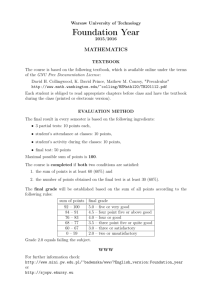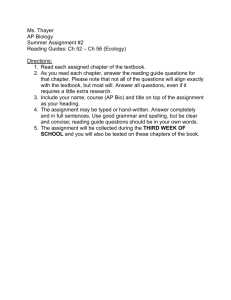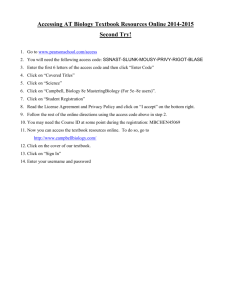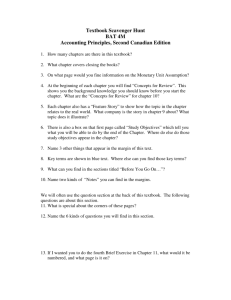Textbook fail and finesse
advertisement
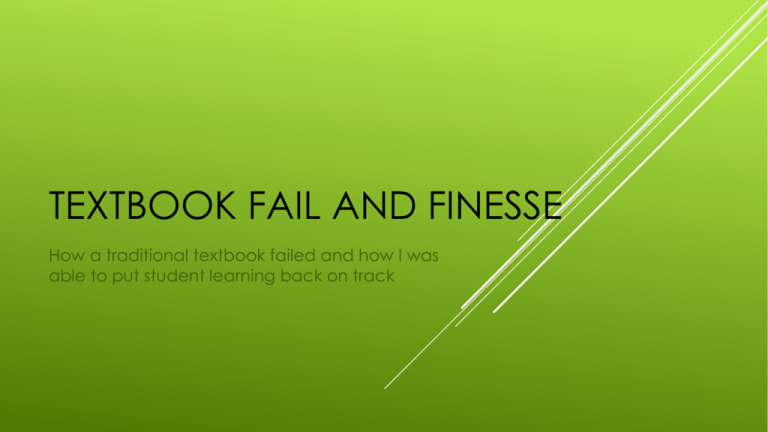
TEXTBOOK FAIL AND FINESSE How a traditional textbook failed and how I was able to put student learning back on track Learning Target: Using the provided lists students will review the material creating their own “Expert, I recognize this, and No clue” list. Students will use class materials and textbooks to fill in their missing information. Summary: Students were preparing for their AP Human Geography exam that was just under a week away. Over the course of the review process they were creating these “Expert, I recognize this, and No clue” lists with vocabulary from throughout the year. The idea was that they were putting the terms in to categories based on their level of understanding and then trying to fill in their missing information by looking up terms and concepts. Near the end we gave them a list of key geographers and their model/theory. They were to make the same knowledge list of this information. How the textbook failed: This is the list that students were going through to determine their level of understanding in regards to geographers and their model/theory. This checklist is based on items that have been on previous AP Human Geography exams so it is implied that this is information that students should know before taking the exam. The issue was that one of my students said they did not know who Alfred Wegener was, did not recognize his Plate Tectonic Theory, and when this student looked up both of those things in our Human Geography textbook they were not able find either the geographer or their theory. Student Feedback: This subject (and textbook) are new to me so when the student told me they could not locate Alfred Wegener or his theory/model, I just assumed that they had not really looked for it. Together we looked through the assigned textbook and glossary and determined that it was not in the textbook. This textbook is a fairly new textbook for us at this school and it was a bit of a fight to get this one, because it does not cover everything that the old textbook does (nor does the old one have everything the new one does). I did know this so I had the student check the old textbook (which we have a class set of) as well. When the student determined that this geographer and his theory was also not in the old textbook he started to question why he even had to know this information if it was not in either of our textbooks. Textbook Finesse: While the student was looking through the second textbook I did a Google search for Alfred Wegener and his Plate Tectonic Theory in order to at least give the student an idea of what he needed to know. When he returned stating that it was not in the old textbook I gave him a very basic explanation of who Wegener was and why his theory was important. By this time I was a bit unsure why something that was not in the textbook would be on the study material for students to know. So I made sure to talk to my mentor teacher about this. His explanation was that because of the massive amount of vocabulary (over 600 terms) and information that were covered in the AP Human Geography course, it is basically expected that not everything would be covered in less than a school year. When I asked why students were given this name and theory that were not in their textbooks it was explained that this list include terms and people that had actually been used on previous AP Human Geography exams and that is why it was included. Textbook Finesse, cont: After learning this from my mentor teacher I made sure to go back and explain to that student (and his classmates) that there were going to be terms and people that could be included in the AP Human Geography text that they did not know or had not heard of before. I explained that there was just too much information to include and we had done our best to give them as much as possible. That is why they might find some things on our study material that they had not seen before. I had tried to prepare them for this throughout the year, but I think this instance finally made it sink in for them. I explained that we were trying to give them as much information as possible in order to make them successful on this exam and they should use any tools available in order to improve their knowledge. I reminded them that there were glossaries on our class website that would also help them in working through issues like this. Evidence of Student Learning: Throughout this process I think that it really became clear to the students that while we try to prepare them to the best of our abilities, there is still a lot of information that is out there and would still be beneficial for them to know. This also shows that textbooks and teachers are not infallible. I wish I could say that there was a question on the AP exam about Alfred Wegener and his Plate Tectonic Theory and all of my students got it right because of this conversation. Unfortunately, I cannot see how they did on individual questions and their scores have not been released yet. I can say that because of the training that they received in our class all students that took the exam shared that they felt confident in answering the “essay” questions that were on the AP exam. What I Learned: There are several things that this textbook fail taught me. One of the main things is that textbooks should not be considered the end-all-be-all for class information and content. I had assumed that because this textbook was selected to be used for this class, that it would contain all of the necessary information. Obviously, this did not turn out to be true. Another thing I learned more about was that something I had already suspected: it’s best to be upfront with students. I let my student know that I did not know all of the information that they needed. I did not know who this person was or where they would be able to find the information. I did offer to help figure out where to find the information. And that is when I sought out another solid source: my mentor. This is just another example of how as a new teacher there will be times where I do not have the answers and I need to look to others for guidance. I was able to rely on my mentor teacher and then go back to the students with a solid answer that helped continue their learning process.

